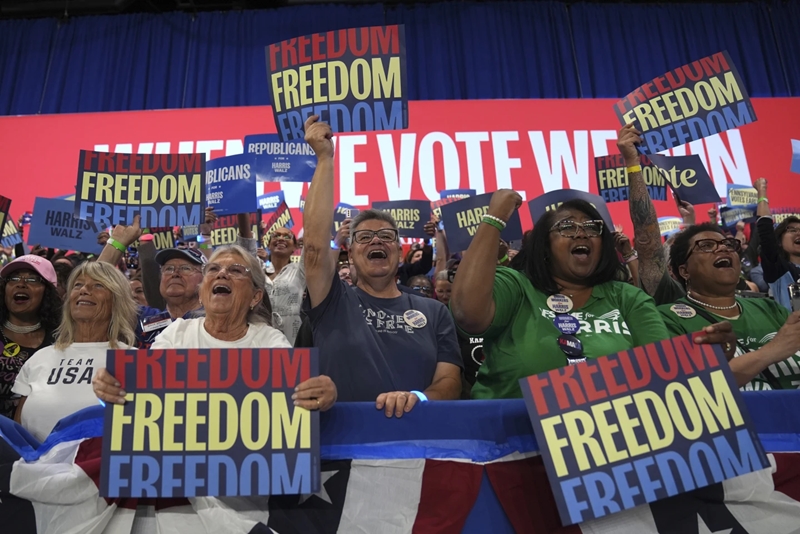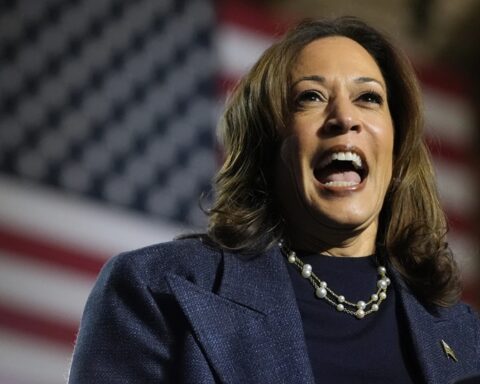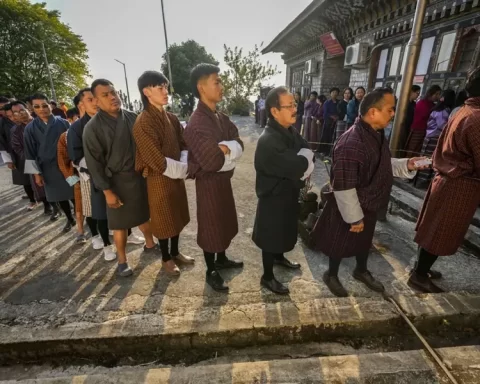WASHINGTON, November 1, 2024 (AP) — President Joe Biden tried to explain this week that he doesn’t really think Donald Trump’s supporters are “garbage,” but that doesn’t mean that other people don’t believe the label occasionally fits.
“I would say that some of them are garbage,” said Samantha Leister, 32, who went to see Kamala Harris at a rally in Harrisburg, Pennsylvania.
As for the rest of them? Leister, whose parents and father-in-law are backing Trump, says they are “misguided.”
That same day, at Trump’s rally in Green Bay, Wisconsin, the idea of voting for Harris was impossible to fathom.
“I just think they are uneducated, and they believe all the lies,” said Shawn Vanderheyden, 44, who went to see Trump with his wife and two young daughters. “It’s unfortunate.”
Vanderheyden still has faith in some people who are supporting the Democratic vice president, saying “hopefully they open their eyes.”
The enduring truth of American politics — one that will undoubtedly outlast the controversy over Biden’s comments and this year’s presidential campaign — is that many Trump and Harris voters view one another with disdain and suspicion. At best, they feel confused by people supporting the other party and anxious about the country’s future after the election.
The wariness between Americans is not new, but interviews with voters in battleground states reveal that it’s only growing deeper and more insurmountable. It’s divided families and friends, and it’s driven people further into their own political tribes.
Some said they believe the country is headed for an even more dramatic splintering.
Braxton Wadford, 20, predicted there would be a “mass exodus” of Americans after the election, regardless of who wins. He said people on both sides can’t imagine living under the opposing party’s leadership.
“The American dream is turning into leaving America,” said Wadford, who voted early for Trump in North Carolina.
Jennifer Phelan, 60, has been volunteering for Harris’ campaign in the same state, pushing undecided voters to cast ballots for the vice president. She’s nervous about the election and can’t see why it’s so close.
“It just seems very much like a cartoon of good and evil,” she said at Harris’ rally in Raleigh.
The political animosity has been building for a while, helped along by historic upheaval. There was the outbreak of a global pandemic, a violent insurrection at the U.S. Capitol and nationwide protests over racial injustice — and that was just in the span of a single year.
The Pew Research Center found that Democrats and Republicans are becoming more likely to view members of the other party as unintelligent, lazy, immoral or dishonest. And nearly everyone has a very or somewhat unfavorable view of the opposing party, according to an AP-NORC Poll from September.
Travis Waters, 54, said Trump supporters are “detached from reality.” He has no one close to him who is a Trump supporter — and he’s not looking to add any.
“I would think that the people who I choose to associate with are not people who support invading the Capitol, say Haitians are eating pets and tell lies,” Waters said while waiting in line for Harris’ event in Harrisburg.
Trump has been a dominant figure in American politics for nearly a decade, contributing to polarization by demonizing his political opponents and fostering a sense of persecution among his followers.
“Look how they’ve treated you,” he said at one of his rallies this week. “They’ve treated you like garbage.”
It was a reference to Biden’s comments after Trump’s recent event at Madison Square Garden, where a comedian called Puerto Rico a “floating island of garbage.”
During a campaign call organized by the Hispanic advocacy group Voto Latino, Biden said that “the only garbage I see floating out there is his supporters. His demonization of Latinos is unconscionable, and it’s un-American.”
Biden later stressed he was talking about the rhetoric, not Trump’s supporters. And Harris said she disagrees “with any criticism of people based on who they vote for.”
Norma Jeffcoat, 72, said she was wounded by criticism over her support for Trump.
“I have loved ones that think I am voting for a racist,” she said at a rally in North Carolina. “It breaks my heart. I love my country so much.”
Jeffcoat is devoutly loyal to the former president, who she said has unfairly suffered through criminal prosecutions, political attacks and assassination attempts.
A Trump flag hanging outside her home has been shredded to pieces by the wind, but she rejected her husband’s effort to replace it.
“I said ’no,’” Jeffcoat said. “It’s staying there until after the election because it symbolizes everything he’s been through.”
Nick Sandquist, 47, said Trump was a hypocrite to criticize Biden over his “garbage” comment.
“It’s ironic for Donald Trump to use name calling for his advantage,” he said at a Harris rally in Wisconsin. “We’re not the type you have to worry about storming the Capitol.”
He said he occasionally talks about the election with his brother and father, who support Trump, but “it doesn’t go very well.”
It was a common refrain from others as well, who describe discussing politics as more trouble than it’s worth.
“Everything we say, they have a ridiculous answer for,” said Debi Franz, 66. “It’s terrible to say because we don’t have a lot of conversations anymore. It’s fruitless.”
Her husband, Phil, 68, agreed.
“I just avoid it,” he said as they waited for Harris to take the stage in Madison.
But at least one person decided to give it a shot this week.
Annette Uhlenberg, 52, attended Harris’ rally in Raleigh and said she was inspired by her talk about rising above political disagreements.
So she took a picture with her campaign sign, wrote a message about putting “country over party,” and sent it to three of her friends who she believes will be voting for Trump.
None of them wrote back immediately.
But maybe, Uhlenberg hopes, it “at least opens the door for conversation.”





